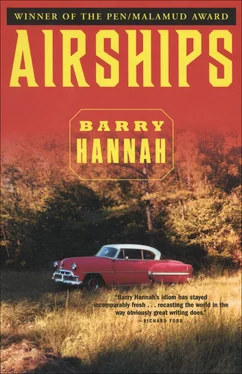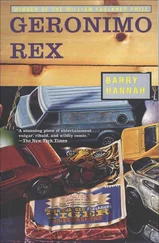“Can you turn your jet around and take off in that big meadow again?” farmer Lutz asked me.
“Yes. I fly it. Taking off’s nothing. We already did the hard part. We’ll be out of here before you wake up.”
“How many women did he kill before you got to him?”
“Read the newspaper a couple days from now. That’s where the number will be.” When he was turning away, I said, “Thanks for your telephone call.”
“We all got to help one another,” farmer Lutz said.
Then I hit the steaks, the potatoes, the onions, the cabbage, the coffee, everything.
“I can’t stand it here,” Reggy John said. “There ain’t no radio, no music.”
He went on talking. Christ.
“I written poems. Beauty and death is the same thing. Death is nothing. I love it so much I got to look at it. I written songs.” He began crooning something demented.
I kicked him in the stomach. When he passed out, he was still crooning.
The men got up and went back to the coffee. The privates sang a song they had made up just for me. Rawr rawr rawr! for Colonel Feather!/Rawr rawr rawr! (pause, then with gusto) forever !
I was in a paradise of affinity. I blushed. I saluted.
“I want to die, Colonel Feather,” Reggy John said. “Would you give me some of them steak leftovers?” This was all spoken very wheezingly. I was sorry. He looked like a philosopher. I hated him with a certain tender feeling. I despise this sort of confusion.
Then the woman, Betsy, came up. She was unashamed and stood with her organ showing. The corporal was behind her. Her head was wrapped up in bandages.
“Don’t hurt Reggy,” she said. “He don’t mean to do nothing.”
Reggy John was right at my shoulder. What a breath.
“Death isn’t nothing,” he said, trying to chew.
“All right, philosopher,” I said.
“I want to adopt her. This ravished child, this babe of the starving South,” the corporal said. He was extraordinarily ugly with his big nose and thick-lensed glasses.
He continued, the corporal did.
“This poor thing never finished even junior high. Her home was a ruined trailer. Three of her brothers were retarded. The other three had no interest in the higher things of life. This here woman touched something new in my heart, sir,” he said.
I told them let’s get out of here. We straightened the barn and walked to the jet. It was good hearing it crank. I backed up and was looking at the sun through the snowflakes. I raised the jet on the elevators and leaned it back. We got out of there.
In the air, making for Atlanta, Reggy John came into the cockpit.
“Death is nothing,” he said. “This is fun. First time I’ve been in a jet.”
The sky had blued up in south Tennessee and we had a rainbow to the left.
“I always thought death was something ,” said Leet. “Generally it means the end of what good you can do your fellow man.”
“There ain’t no fellow man but me,” said John. His breath was devastating. “I’m thirsty. You got a drink?”
Leet fixed him the drink. It came in a martini glass. The taste is exquisite but there are flakes of glass in the gin. They burn constantly but do not kill. Elimination can become a problem. John, who was thirty, would last many years with it. The drink creates a slavish thirst for the next drink. It calms the need for six hours. Then the great thirst comes again. He drank it. The man thinks he is an alcoholic but the need is much worse than that.
He will come crawling back to us forever and we will give him the drink and kick him out.
He was surprised there were no cops in Atlanta. He told me, as he walked off in the airport, that he was really surprised.
“Live a long time, like the rest of us,” I said.
The corporal took away the woman dressed in his own fatigues. The fool.
I am so rich. I am so important.
My wife knows this. She is ready. I am exactly on time. She is drenched in perfume and is in the veil. Her secret hair is trimmed and shaped. On her feet are silver sandals. Her rear is raised. She has her face on a cushion of velvet. The child is asleep upstairs. A few logs are burning in the fireplace. I shower and enrobe myself. She is still on the floor, knees on the rug, rear high and overcomingly sweet with perfume. She says darling darling darling.
This is my fifth wife. Lucky for me at last I got the right one.
They used to call French Edward the happiest man on the court, and the prettiest. The crowds hated to see him beaten. Women anguished to conceive of his departure from a tournament. Once, when Edward lost a dreadfully long match at Forest Hills, an old man in the audience roared with sobs, then female voices joined his. It was like seeing the death of Mercutio or Hamlet going down with a resigned smile.
Dr. Levaster drove the Lincoln. It was rusty and the valves stuck. On the rear floorboard two rain pools sloshed, disturbing the mosquitoes that rode the beer cans. The other day Dr. Levaster became forty. His hair was thin, his eyes swollen beneath the sunglasses, his ears small and red. Yet he was not monstrous. He seemed, though, to have just retreated from conflict. The man with him was two years younger, curly passionate hair, face dashed with sun. His name was French Edward, the tennis pro.
A mosquito flew from one of the beer cans and bit French Edward before it was taken out by the draft. Edward became remarkably angry, slapping his neck, turning around in the seat, rising and peering down on the cans in the back, reaching over and smacking at them. Then he fell over the seat head-down into the puddles and clawed in the water. Dr. Levaster slowed the Lincoln and drove into the grass off the highway.
“Here now, here now! Moan, moan!” Dr. Levaster had given up profanity when he turned forty, formerly having been known as the filthiest-mouthed citizen of Louisiana or Mississippi. He opened the back door and dragged Edward out into the sedge. “You mule.” He slapped Edward overvigorously, continuing beyond the therapeutic moment.
“He got me again. . I thought. He. Doctor Word,” said Edward.
“A bug. Mule, who do you think would be riding in the back of my car? How much do you have left, anything?”
“It’s clear. A bug. It felt just like what he was doing.”
“He’s dead. Drowned.”
“They never found him.”
“He can’t walk on water.”
“I did.”
“You just think you did.” Dr. Levaster looked in the back seat. “One of your rackets is in the water, got wet. The strings are ruined.”
“I’m all right,” French Edward said.
“You’d better be. I’m not taking you one mile more if we don’t get some clarity. Where are we?”
“Outside New York City.”
“Where, more exactly?”
“New Jersey. The Garden State.”
At his three-room place over the spaghetti store on Eighty-ninth, Baby Levaster, M.D., discovered teen-agers living. He knew two of them. They had broken in the door but had otherwise respected his quarters, washed the dishes, swept, even revived his house plants. They were diligent little street people. They claimed they knew by intuition he was coming back to the city and wanted to clean up for him. Two of them thought they might have gonorrhea. Dr. Levaster got his bag and jabbed ten million units of penicillin in them. Then French Edward came up the stairs with the baggage and rackets and went to the back.
“Dear God! He’s, oh. Oh, he looks like love! ” said Carina. She wore steep-heeled sandals and clocked about nineteen on the age scale. The others hung back, her friends. Levaster knew her well. She had shared his sheets, and, in nightmares of remorse, he had shared her body, waking with drastic regret, feeling as soiled and soilsome as the city itself.
Читать дальше












